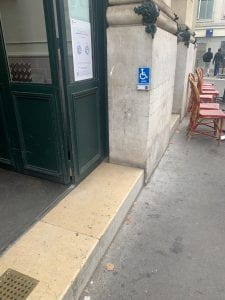When coming to GTL, one question on my mind was “can I study abroad with a disability?” In my search for a study abroad experience, I constantly came across “requirements” such as “Climbing stairs (elevators are not always available overseas)” or “Walking over very long distances” or “Carrying packed suitcases and other personal belongings with no help.” A common sentiment in the disabled community is that having a disability is not the issue, inaccessibility is.
In my first post, I casually mentioned that I am a part-time wheelchair user and that I cannot literally run around the world, but other than that, I’ve put on a façade of being pretty much non-disabled, and that changes right now.
Allow me to reintroduce myself: My name is Mira, I am a third-year biomedical engineering student, I have a disability and sometimes use a wheelchair. Even though I spent my whole summer working abroad, I was nervous to study abroad, being away from my medical comfort zone for such a long period of time. In Atlanta, I have housing accommodations and my wheelchair stays in my dorm room (instead of at my parents’ house) in case I need it urgently. I flip-flopped between deciding to leave my wheelchair at home or to take it abroad with me. I had never travelled alone with my wheelchair – how would I maneuver my suitcases through the airport? How would I get my bags at baggage claim in France? How would my wheelchair fit on the shuttle to GTL? I’d first like to debunk the “carrying packed suitcases with no help” requirement. There will be people to help you, and it’s okay to ask for help.
I worked with the Office of Disability Services to figure out how to transfer my accommodations to GTL (what would accessible housing look like?), and luckily the administration at GTL is incredibly welcoming and more than happy to help. I was able to secure a room designed for wheelchairs in the Lafayette Residence, access to the elevators at GTL, and peace of mind that my chair would make it between the airport and Metz. As an ambulatory wheelchair user, it was easy for me to transfer to the bus and keep my chair tucked underneath. If you aren’t ambulatory, it may take more planning, but I’m confident it won’t be an issue!
The next question I intended to tackle was “can I travel with a disability?” The short answer: yes. The long answer: yes with intense planning. The major form of transportation for GTL students are trains. When I bought the Eurail pass, I contemplated getting the 1st class ticket because some wheelchair travel blogs said it was 100% necessary, but others said it is perfectly fine to get the 2nd class ticket. After experiencing trains first-hand, I can say I definitely made the right decision to save money and buy the 2nd class ticket. There are wheelchair accessible 2nd class compartments, so don’t waste your money. The complicated thing about traveling via train is that depending on what country you’re in or going to, the mobility assistance procedure changes. The Eurail website has a great resource for all the train companies in one place, which can help you figure out how far in advance you have to let the train company know that you’re coming. Also, in almost every major train station I’ve been in, there has been a mobility assistance kiosk or room to help with any issues that may arise. Trains have specific sections that are wheelchair accessible and train station workers are there to help you with the technology to get on and off the train with a wheelchair. I have not yet done a weekend trip in my chair, but it’s nice to know it’s an option.

Metz and disability? Every public bus I’ve been on has been wheelchair accessible. Curb cuts are pretty standard. Metz is fairly flat – you don’t have to worry about pushing yourself up too many hills. Tactile information is present, but the amount of it depends on what part of Metz you’re in. For example, GTL has a lot of tactile information outside the building, but the sidewalks leading to GTL have less.
Lots of stores in downtown Metz are up a step, but there are accessibility buttons that you can press to either activate a ramp or call an employee to bring a ramp.

Accessibility is also incredibly abundant around Europe, but again, the quality and quantity depends on the country and city. For example, Amsterdam has a lot of tactile information around the main train station, but hardly any once you actually cross the street. Sidewalk quality varies around Europe and cobblestone can be tricky to navigate. Hilly places like Porto have stairs spread out around the city, but there are also cable car options to help get up the hills. Tourist attractions, such as castles and cathedrals generally have a miniature replica with braille information. I saw a lot of that in Krakow!

TL;DR It *IS* possible to study abroad with a disability, but it does take a little extra planning. GTL is a great place to study abroad because the administration is so welcoming and willing to help transfer accommodations from Atlanta to Metz. My study abroad experience with an exchange program might not have been as seamless if it was not with GTL or another GT faculty-led study abroad experience.
